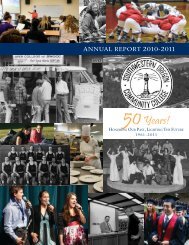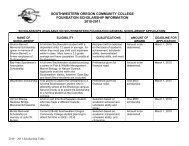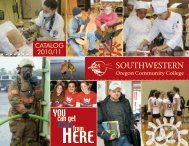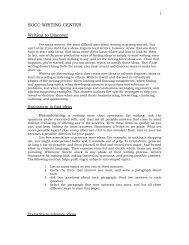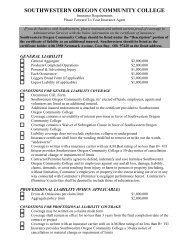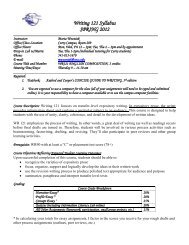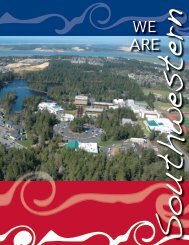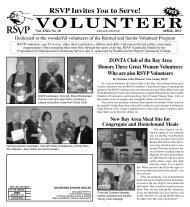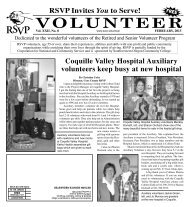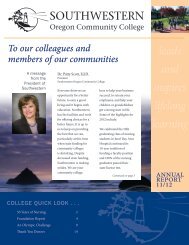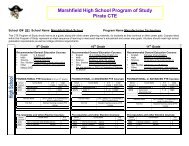Part 1 3.7.qxp - Southwestern Oregon Community College
Part 1 3.7.qxp - Southwestern Oregon Community College
Part 1 3.7.qxp - Southwestern Oregon Community College
Create successful ePaper yourself
Turn your PDF publications into a flip-book with our unique Google optimized e-Paper software.
Course Descriptions<br />
ECE209 Theory and Practicum<br />
3 credits (1 lec, 6 lab hrs/wk)<br />
Assists students in developing their leadership potential<br />
through classroom discussion and practicum<br />
opportunities in early childhood education classrooms.<br />
Students will also gain experience and orient themselves<br />
to the various roles of the early childhood educator.<br />
Students will gain experience in working with young<br />
children in a supervised setting and assisting with<br />
various daily activities in a preschool program. Students<br />
will gain experience in observation/assessment and<br />
guidance techniques.<br />
ECE240 Lesson and Curriculum Planning<br />
3 credits (3 lec hrs/wk)<br />
Instruction is planning daily and weekly activities for Early<br />
Childhood Education teachers. Methods and materials<br />
are used to focus learning on the whole child's needs<br />
including social, emotional, creative, physical and<br />
cognitive, developmentally appropriate practice, and<br />
multiple intelligences.<br />
ECE261 Student Teaching I, Early Childhood<br />
Education<br />
6 credits (2 lec, 12 lab hrs/wk)<br />
Students will engage in supervised teaching of young<br />
children in a laboratory setting. Students will apply what<br />
they have learned through coursework and previous lab<br />
work-curriculum planning, observation/assessment, daily<br />
planning, working with children and families.<br />
Prerequisite: ECE163 with a “C” or better.<br />
ECE262 Student Teaching II, Early Childhood<br />
Education<br />
6 credits (2 lec, 12 lab hrs/wk)<br />
Students will continue to engage in supervised teaching<br />
of young children in a laboratory preschool and in a<br />
community setting.<br />
Prerequisite: ECE261 with a “C” or better.<br />
ECONOMICS<br />
ECON198/298 Independent Studies in<br />
Economics<br />
1-3 credits (hrs to be arranged)<br />
Student and instructor identify a project or problem in<br />
economics and jointly draw up a contract. The contract<br />
sets forth a proposal to complete the project or solve the<br />
problem. The contract identifies objectives, procedures,<br />
and equipment needed, together with key checkpoints for<br />
student instructor conferences.<br />
Prerequisite: Instructor consent.<br />
ECON201 Microeconomics<br />
4 credits (4 lec hrs/wk)<br />
Analyzes the market system, with attention given to the<br />
role of households, firms, and government in determining<br />
wages/prices and the allocation of productive resources.<br />
Prerequisite: MTH94 with a “C” or better or appropriate<br />
score on placement test.<br />
ECON202 Macroeconomics<br />
4 credits (4 lec hrs/wk)<br />
Analyzes the national economy as a whole, with attention<br />
given to determining national income, business cycles,<br />
economic growth, fiscal and monetary policy, and<br />
international trade.<br />
Prerequisite: MTH94 with a “C” or better or appropriate<br />
score on placement test.<br />
EDUCATION<br />
ED101 Introduction and Observation and<br />
Experience<br />
3 credits (3 lec hrs/wk)<br />
This introductory course focuses on the history of<br />
education. Students will review the value and usage<br />
of objective/subjective observations as a teaching<br />
tool. Specific times for elementary/secondary level<br />
classroom observation as well as a regular group<br />
discussion of observation experiences will be included.<br />
ED113 Instructional Strategies in Language Arts<br />
and Reading<br />
3 credits (3 lec hrs week)<br />
This introductory course for future educators will focus on<br />
specific concepts related to the development of reading<br />
and language abilities as well as the development of<br />
a literacy-rich learning environment. Reading and<br />
language development concepts covered include book<br />
and print awareness; phonological awareness; language,<br />
comprehension, and response to text; letter recognition,<br />
decoding, and word recognition; fluency and oral reading;<br />
spelling and writing; and working with students who are<br />
exhibiting reading and language development<br />
difficulties. Students will use their skills to develop<br />
reading and language activities and lesson plans for use<br />
in their practicum experiences, future classrooms, and<br />
particular grade-level interests.<br />
<strong>Southwestern</strong> <strong>Oregon</strong> <strong>Community</strong> <strong>College</strong> 2006-07 Catalog www.socc.edu Course Descriptions 166



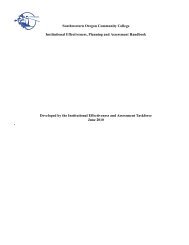
![SWOCC Viewbook [PDF] - Southwestern Oregon Community College](https://img.yumpu.com/26373688/1/190x245/swocc-viewbook-pdf-southwestern-oregon-community-college.jpg?quality=85)
